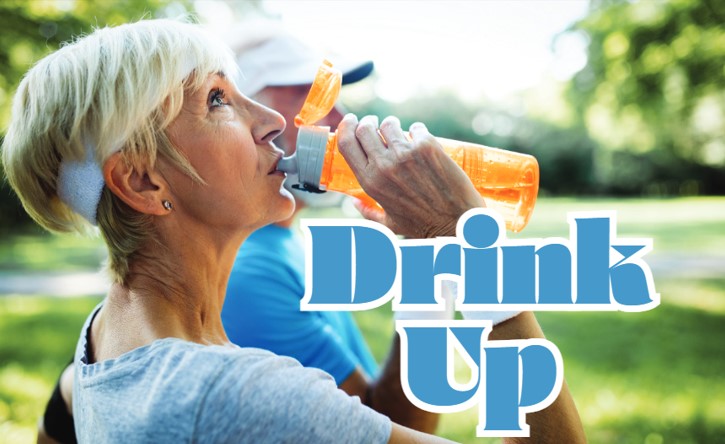Hydration is Linked to Healthy Aging
Are you drinking enough water? It’s essential for aging well and there’s science too back that up. “Adults who stay well-hydrated appear to be healthier, develop fewer chronic conditions, such as heart and lung disease, and live longer than those who may not get sufficient fluids, according to a National Institutes of Health study published in eBioMedicine.” notes a 2023 NIH news release entitled “Good hydration linked to healthy aging.”
 The study involved health data gathered from more than 11,000 adults over a 30-year period, notes a 2023 NIH news release entitled Good hydration linked to healthy aging. “Researchers analyzed links between serum sodium levels—which go up when fluid intake goes down—and various indicators of health. They found that adults with serum sodium levels at the higher end of a normal range were more likely to develop chronic conditions and show signs of advanced biological aging than those with serum sodium levels in the medium ranges. Adults with higher levels were also more likely to die at a younger age.
The study involved health data gathered from more than 11,000 adults over a 30-year period, notes a 2023 NIH news release entitled Good hydration linked to healthy aging. “Researchers analyzed links between serum sodium levels—which go up when fluid intake goes down—and various indicators of health. They found that adults with serum sodium levels at the higher end of a normal range were more likely to develop chronic conditions and show signs of advanced biological aging than those with serum sodium levels in the medium ranges. Adults with higher levels were also more likely to die at a younger age.
“The results suggest that proper hydration may slow down aging and prolong a disease-free life,” said Natalia Dmitrieva, Ph.D., a study author and researcher in the Laboratory of Cardiovascular Regenerative Medicine at the National Heart, Lung, and Blood Institute (NHLBI), part of NIH.
Drink up, unless you have a health condition, such as heart or kidney problems, that necessitates fluid restriction. For everybody else—especially peeps in the 55+ age group—there are numerous benefits to drinking plenty of water and non-sugary, non-alcoholic beverages on the daily.
 “Drinking enough water each day is crucial for many reasons: to regulate body temperature, keep joints lubricated, prevent infections, deliver nutrients to cells and keep organs functioning properly. Being well-hydrated also improves sleep quality, cognition and mood,” according to the Harvard T.H. Chan School of Public Health.
“Drinking enough water each day is crucial for many reasons: to regulate body temperature, keep joints lubricated, prevent infections, deliver nutrients to cells and keep organs functioning properly. Being well-hydrated also improves sleep quality, cognition and mood,” according to the Harvard T.H. Chan School of Public Health.
It’s good for your skin, your tissues, your blood pressure, organs, digestion and bodily functions. Good hydration also supports cognitive function, including short-term memory, concentration and alertness. On the other hand, dehydration is linked to a host of issues, from headaches and dizziness to constipation, fatigue and confusion. In warmer weather, it’s especially important to stay hydrated, particularly if you’re active and spending time outdoors.
The recommendations for daily fluid intake vary based on a lot of factors. The important thing is to drink fluids, preferably water, right through the day and drink more when it’s hot or you’re active. Avoid soft drinks and other sugary drinks and limit your consumption of caffeinated and alcoholic beverages.
Also, it’s important to be mindful of signs of dehydration, such as a dry mouth and lips, dark urine, fatigue, weakness, lightheadedness and irritability.






